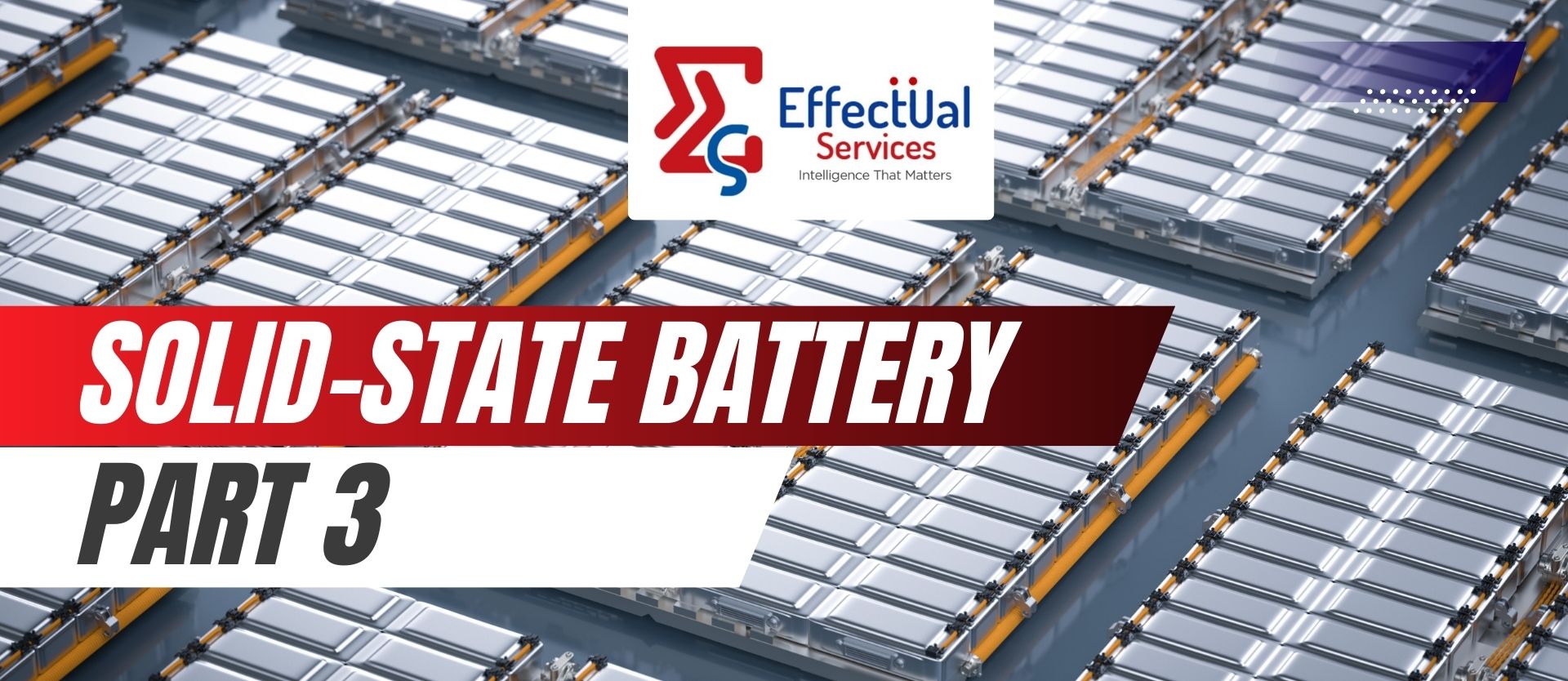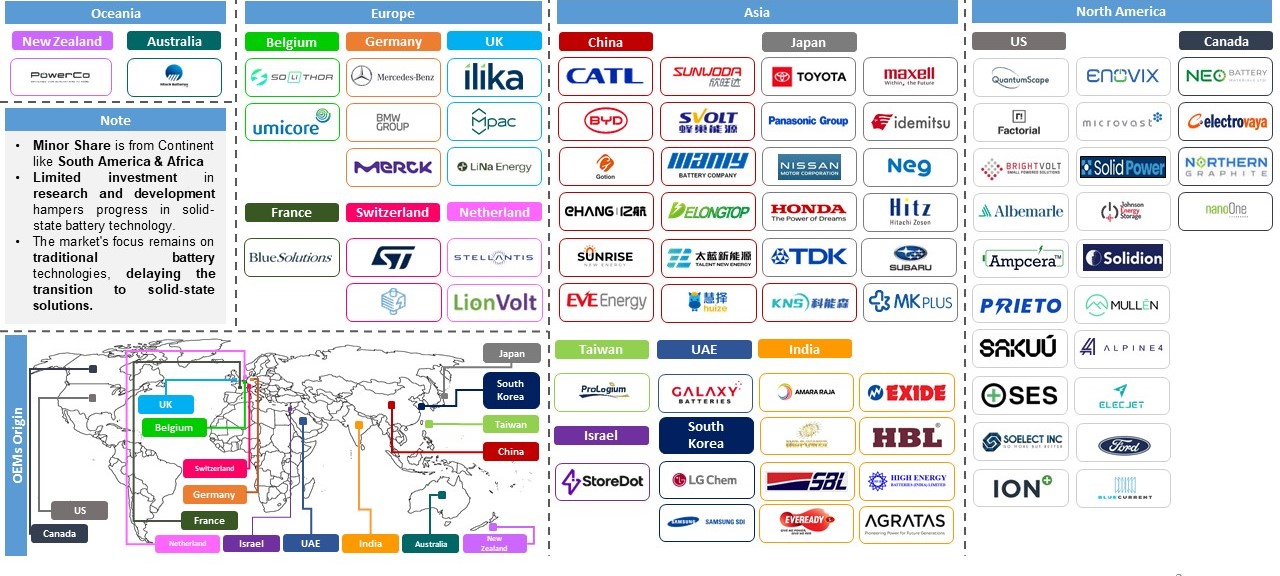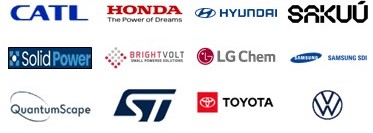Solid-State Batteries: Collaborative Ventures & Future Technologies

Solid-state batteries (SSBs) revolutionize energy storage by replacing flammable liquid electrolytes with safe solid materials, enabling lithium ions to move efficiently during charge and discharge for compact, high-density designs. Boasting thermal resilience, non-combustible properties, and superior energy storage, they offer lighter weight, rapid charging, and design flexibility. Driven by sulphide, polymer, and oxide electrolytes each balancing conductivity, stability, and cost SSBs target a $9 billion market by 2035, powering automobiles, satellites, electronics, chemicals, and industrial storage.
Read Also: Solid-State Batteries: Overview
Global OEMs Origin
The landmark of OEMs defines their origin, playing a crucial role in the market for solid-state batteries.
Note:
- Minor Share is from Continent like South America & Africa
- Limited investment in research and development hampers progress in solid-state battery technology.
- The market's focus remains on traditional battery technologies, delaying the transition to solid-state solutions.

Latest Collaboration
Ventures Collaborating on the Development of Latest Solid-State Battery Technology
Solid State Battery includes higher energy density, enhanced safety, and a longer lifespan compared to traditional batteries. This advancement offers significant improvements in performance and reliability.
Stellantis & Factorial
Stellantis and Factorial are advancing electric vehicle technology with solid-state batteries to accelerate the future of EVs.
- Stellantis is integrating Factorial's solid-state batteries into a demo fleet of all-new Dodge Charger Daytona vehicles built on the STLA Large platform.
- These EVs, featuring solid-state batteries, will hit the road by 2026, marking a major step toward mass production.
- Stellantis is using Factorial's solid-state batteries with 390 Wh/kg energy density to boost performance and affordability in its electrification strategy.
- Stellantis chose the STLA Large platform for its focus on high-volume electric SUVs and performance vehicles, supporting brands like Jeep®, Dodge, and Maserati.
- This platform, part of the Dare Forward 2030 plan, can support up to two million vehicles, ideal for the new battery technology.
Benefits:
- High Performance
- High Capacity
- Lower Cost
- Long Range
- Quick Charging
- Investment: $75M
BMW & Blue Solutions
Solid Power and BMW Deepen Joint Development Partnership.
Solid Power grants the BMW Group a license for its cell design and manufacturing processes, enabling simultaneous research and development efforts.
Capability: Solid Power will provide sulfide-based solid electrolyte for BMW's cell prototypes. Both companies will collaborate to optimize manufacturing for efficient, scalable production.
Finance: BMW will invest in Solid Power with $20 million by June 2024, contingent on milestone achievements, supporting its ongoing R&D.
Alignment: The partnership highlights both companies' commitment to advancing solid-state battery technology, promising higher energy density and improved safety over lithium-ion batteries.
Benefits:
- Decent Energy Density
- Focused R&D
- Improved Efficiency
Toyota & Idemitsu
Idemitsu and Toyota have announced the start of their collaboration to mass-produce all-solid-state batteries for BEVs.
To prepare for mass production, both companies have formed a task force and will proceed with the collaboration as follows:
- Phase 1: Idemitsu and Toyota will collaborate to enhance sulfide solid electrolytes and demonstrate mass production at Idemitsu's pilot facility.
- Phase 2: Idemitsu will set up a pilot facility for sulfide solid electrolyte production, while Toyota aims to launch all-solid-state battery BEVs by 2027-28.
- Phase 3: Building on Phase 2 results, both companies will explore full-scale mass production and commercialization.
Future Scope
SSB: Advancing Projects, Strengths and Initiatives for Further Development
The impact of solid-state batteries on the transition from traditional to next-generation technology, through collaborations among key players, will drive economic growth and raise awareness.
SSB: Current Status
Technological Snapshot:
Solid-state batteries store more energy, leading to longer-lasting electric vehicles (EVs) and devices.
The use of non-flammable solid electrolytes reduces fire risks compared to liquid electrolyte batteries.
Solid-state batteries last longer, with fewer cycles before degradation.
- Challenges in SSBs
- Traditional Cathode Material
- Emerging Cathode Material
- Optimize Cathode Material
- Advanced Cathode in SSBs
- Evaluate Cathode Material
- Identify Research Gaps
- Future Development
SSB: Future Strengths
- New Material: Increasing Ion Conductivity in SSBs.
- Scalability: Cost effective, Quality Control.
- Technology Innovation: Novel Sintering Method in AI/ML.
- Mechanical Durability: Long-term performance and resistance to stress.
- Chemical Stability: Inorganic oxide electrolytes: high conductivity, low electronics.
- Thermal Stability: Safer operation under extreme temperatures.
- Electrochemical Stability: Flexible, solvent-free electrolytes advance hybrid ASSBs.
- Interface Protection: Increase rigidity in rundowns and boost performance.
SSB: Next Gen OEMs

SSB: Upcoming Projects
- 2025: Hyundai plans to commence pilot production of all-solid-state batteries, aiming to equip electric vehicles with this technology by the same year.
- 2025: Nissan intends to produce its first batch of solid-state batteries, marking a significant step toward mass production.
- 2026: Stellantis plans to launch a demonstration fleet of Dodge Charger Daytonas with semi-solid-state batteries.
- 2027: Toyota aims to introduce its first solid-state battery electric vehicle, marking a significant milestone in the automotive industry.
- 2028: Volkswagen's next-generation Golf model is expected to feature solid-state battery technology, aligning with industry trends.
- 2030: Honda plans to equip electric vehicles with long-range solid-state batteries and potentially doubling driving range.
Read Also: Solid-State Batteries: EV Adoption and Product Insights
About Effectual Services
Effectual Services is an award-winning Intellectual Property (IP) management advisory & consulting firm offering IP intelligence to Fortune 500 companies, law firms, research institutes and universities, and venture capital firms/PE firms, globally. Through research & intelligence we help our clients in taking critical business decisions backed with credible data sources, which in turn helps them achieve their organisational goals, foster innovation and achieve milestones within timelines while optimising costs.
We are one of the largest IP & business intelligence providers, globally serving clients for over a decade now. Our multidisciplinary teams of subject matter experts have deep knowledge of best practices across industries, are adept with benchmarking quality standards and use a combination of human and machine intellect to deliver quality projects. Having a global footprint in over 5 countries helps us to bridge boundaries and work seamlessly across multiple time zones, thus living to the core of our philosophy - Innovation is global, so are we !!!
Solutions Driving Innovation & Intelligence
Enabling Fortune 500's, R&D Giants, Law firms, Universities, Research institutes & SME's Around The Globe Gather Intelligence That
Protects and Nurtures Innovation Through a Team of 250+ Techno Legal Professionals.


